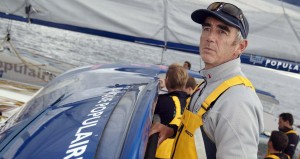Right from his very first attempt in 2012, Loïck Peyron set a new Jules Verne Trophy record. At the helm of the maxi-trimaran Banque Populaire V, the sailor from Nantes finished his circumnavigation in 45 days, 13 hours, 42 minutes and 53 seconds – a record which Francis Joyon is currently attempting to beat. The sailor who has previously won one Route du Rhum, 3 Single-Handed Trans-Atlantic Races, and 2 Jacques-Vabre Transats, goes back over his experience of the Jules Verne. An experience that he doesn’t rule out trying again if the record is beaten.

What is your favorite memory of the Jules Verne Trophy?
The arrival! When you race against other competitors, it’s disappointing not to win, but this happens all the time. You lose more than you win, but this doesn’t mean that there aren’t good memories all the same. I’ve tried to set very few records in my life as a sailor, but I’ve been fortunate: luck has smiled on me every time, immediately, as of the first attempt. As a result, I haven’t experienced the frustration of many of my colleagues who have often made attempts and not always succeeded first off. In addition, a Jules Verne Trophy arrival is all the greater because it’s collective, shared with the others on board.
What is your worst memory?
Everything has gone relatively smoothly for me even if things aren’t easy every day, and there are moments of stress. In any case, my worst memory remains ice and icebergs – something that generates both fear and fascination. I had the luck to see a great deal of them during my first Vendée Globe. At the time, no southern limit was set, as there now exists today for the Jules Verne. At that time, we set our own limits. You need to understand that when you’re alone on board, you’re the sole master of your decisions, and you’re responsible for yourself only. In this case, risk-taking in theory doesn’t generate any collateral damage. But when you’re a skipper with 13 other persons on board, you have a responsibility to bring home the boat and the men. And this is a much more difficult burden to bear. When you find yourself in complicated situations, it’s not easy to live with this weight, but you can’t share your worries too much because the leader’s aim is to ensure that things go well, without distress.
Tell us about your Trophée Jules Verne…
Records have always fascinated me, even if, since the start of my career, I’ve focused more on competition against others rather than against the clock. It’s my big brother who has specialized more in this domain. But what nonetheless made my mind up about the Jules Verne was that I was asked to do it. Remember that I arrived like a hair in a soup, like a music conductor called on stage at the last moment. It was Pascal Bidegorry who introduced me to this beautiful story, the creation of this boat and the crew. An exceptional boat, and a perfectly well prepared and trained team were in place. All I had to do was to implement all his work. I often say it: I was a little saltcellar on the table. Today, when I think back to my first day at the Jules Verne, I think that this was possibly the most delicate moment. I embarked on the Banque Populaire, off Lorient, exiting the port in the most secret manner possible because at the time, there was a bit of a buzz about who was going to replace Pascal. This was the most delicate moment I’ve ever experienced in human terms, because even the crewmembers on board didn’t know who was going to arrive. Thankfully, things went incredibly well!
Today, what do you prefer: navigating solo or in a team?
Both. I have no preference. I’m one of the rare sailors who’ve had the luck to be involved in so many different activities, to hold a Jules Verne title with my Banque Pop’ friends, to be at the helm of a boat in an America’s Cup final… I know that I’ve been incredibly lucky. After, it all remains an incredible amount of work. My great specialty is being a generalist.
What does the Jules Verne Trophy represent for you?
It’s highly symbolic, and it’s also something that we can describe as being a “family” story as my brother and I have beaten the record 4 times.
Do you think that you’ll take on the Jules Verne again one day?
You need to be beaten to go back to it. In sailing, this is the way it goes: you wait to be beaten and then you go back to work. If weather conditions are perfect, there’s no doubt that the record will be improved. After, I should say that the joy of a Jules Verne also lies in its preparation. Which is something I haven’t had the opportunity to experience. I’m also constantly designing vessels of the future for myself and others. But however these future vessels may be, we’ll also stay dependent on the weather. And this makes the Jules Verne a little frustrating. What might block me is precisely this long labor at the end of which you’re not sure of succeeding – or even of being able to depart.
Do you have a message for Francis Joyon, currently attacking the Jules Verne?
Yes, that he do it well! I’m always impressed by the way he sails because he attacks like crazy, all the time. At the moment, he has really perfect conditions. What I can say to all future sailors taking on the Jules Verne is that this is the record that they’re going to have to beat. The bar will go higher and higher, this is a certainty, but a record is definitely made in order to be beaten.
Interviewed by Isabelle Trancoen

